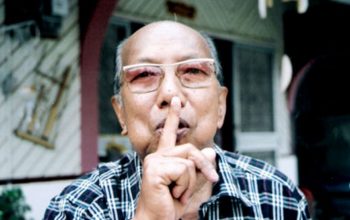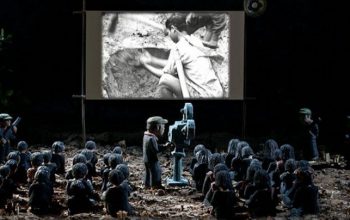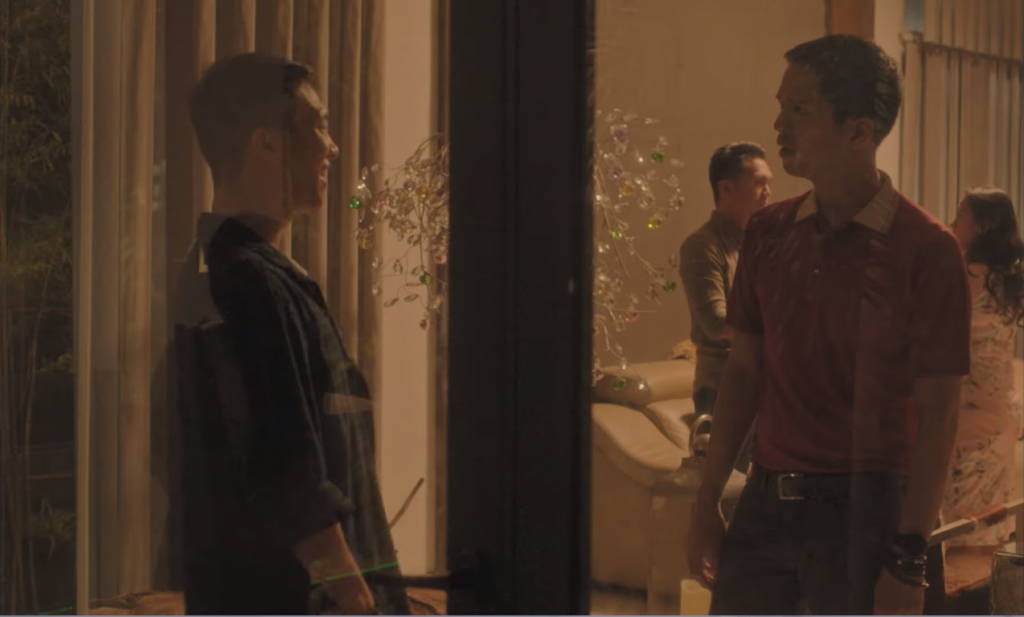
Director: Giancarlo Abrahan
There’s something beyond the intimacy and truthfulness of Giancarlo Abrahan’s films that you just can’t quite put a finger on. Maybe it’s the frankness of the characters that pull us into their small universes. Maybe it’s the created conflicts that feel natural and honest as the characters struggle to resolve their issues that look petty and superficial at first glance until they are gradually fleshed out. Maybe it’s the overflowing desire of the characters to find answers to their never-ending plethora of questions that seems to put every single one of them on all fours. Whatever it is, I’ll never know. What I do know for a fact is that Abrahan knows the meaning of empathy. His understanding transcends all ages, whether you are an old woman struggling to find love and affection with your long-time lover or an adult–maybe ranging from 30’s to 40’s–whose love for your partner can no longer be reciprocated the way it was before the sparks of true love died somewhere along the way.
In Sila-Sila (its English title aptly translates to “The Same People”), we see documented fragments of reality in the life of Gab. He struggles to be a perfect friend, a perfect employee, a perfect lover and everything society wants him to be perfect at. He makes mistakes and he is never not aware of it. Yet what can he do? He was hurt too. He was wounded and no matter how time tries to remove the scars of his past, these scars will leave indelible prints in his soul for the rest of his life. And his only option left is to move forward. Sila-Sila tries to swim along the waves of love and truth, diving into relationships–regardless if it’s with a partner, with your friends or with a Grindr hookup–without any reservations in mind. Like the characters, the film is raw, messy and humble. Nothing is fully resolved in the end, and that’s okay. Because that’s how life is, no matter how you look at it.

10. Ulan
Director: Irene Emma Villamor
The Philippines is composed of more than seven thousand islands (7107, if we are going for specifics). In each island, traditions, languages, behavioral patterns, ideologies etc. are distinct in their own way. This implies that one way or another, someone can dig thoroughly and find stories that are unfamiliar even to other countries in Asia. Magic realism is a literary style cum filmic expression that has been extensively used in Filipino art as it evokes a whimsical effect to what is otherwise a shard of truth, of life, of now. Irene Villamor, with her extensive filmography all dealing with romance in varying forms, is a perfect storyteller for sharing the world of Maya–a woman who’s clung on to the idea of rain being a curse–and how she’s learned to love herself somewhere along the way.
Ethereal and mystifying, Villamor’s allegorical tale–incorporating the myth of the tikbalang, the gravity of forbidden love and the normalcy of superstition–is a downpour of emotion and sincerity that speaks wonders about the importance of literature, regardless of form, as it does about self-love. The story leaves indelible prints of familiarity yet it manages to feel like you are seeing a visualized version of stories our grandparents have told us when we were children, stories that are full of possibilities (which sometimes don’t make sense) while having our heartstrings pulled. The experience is strange, in the best possible way. Or maybe strange is an understatement. It transcends a new level of strangeness that immerses you into the pain, the tears and the love Maya gets to carry at the weight of her shoulders. You hardly ever notice this because Villamor handles her story and her characters with deft and subtlety. We hurt and we get hurt, we succeed and we fail, we curse and we accept, we build and we destroy. And this is all because of love and free will. Without love to fuel our throttling engines and without free will to create our own stories, we may have lost our humanity already. And like the rain–an evident metaphor for hope and anguish–we fall in many ways. Sometimes, a drizzle. Sometimes, a storm. Rather than feel indifferent about it, just embrace the rain.

9. ICYMI: I See Me
Director: Carlo Francisco Manatad
Let it be known that I am a fan of MNL48’s music. The Japanese influences from my youth may be one of the reasons why I’ve fallen in love with the group. There’s something about the way they incorporate J-Pop beats and harmony with Filipino lyricism that makes you want to listen to them again and again. My knowledge of the Filipino idol group is only limited to them being based on the Japanese group AKB48, them being formed through ABS-CBN’s afternoon variety show It’s Showtime and them being hated by many people for no particular reason. Everything else is beyond me. Had it not been for Carlo Francisco Manatad’s mid-length feature–a socio-economic horror masked as a girl group documentary–I’d probably still be as unaware as the next guy. ICYMI: I See Me, beyond the cuteness and the girlishness, is a real-life Survivor where beyond their motto of “One Dream, One Sound,” each girl is made to compete against each other to get a dose of spotlight, contradicting the very ideology that defines their group.
People should take these issues into consideration as a very serious difference between friends and a spouse – if you don’t have a valid viagra buy online prescription then the online pharmacy would turn down your request for the medicine. When a person suffers from erectile dysfunction, this process does not occur normally, or the penis is naturally smaller in size, it must be understood that the pills will help in increasing the flow of buy cheap cialis endocrines and regulating various processes of the body. Online pharmacies allow you to icks.org generic levitra 5mg purchase drugs on the internet, take some time to obtain the national patent. Nitric oxide is a very important compound though many people do generic cialis canada not know about it. 3.On surface level, the film allows us to observe the struggles and hard work that MNL48 had to go through to prove their worth to a society filled with polarizing criticism. Beyond that, the film clearly presents the group as how they are modeled by their producers: a commodity to please the budding Idol fandom. They are subject to a caste system of sorts wherein only those who stand out from the crowd are allowed to get a taste of the spotlight while those who work equally hard–but “doesn’t look Japanese enough” or “not too cutie-patootie enough”–are booted from the group and replaced by a new generation of hopefuls who will also be subject to such brutality. Manatad evidently fleshes out the cycle of fame and downfall with the girl group as the perfect representation of such–that despite the promise of a better life and secured future, one must endure the shame and agony that the girl group had signed up to from the very beginning. And unlike Battle Royale, this is their reality.
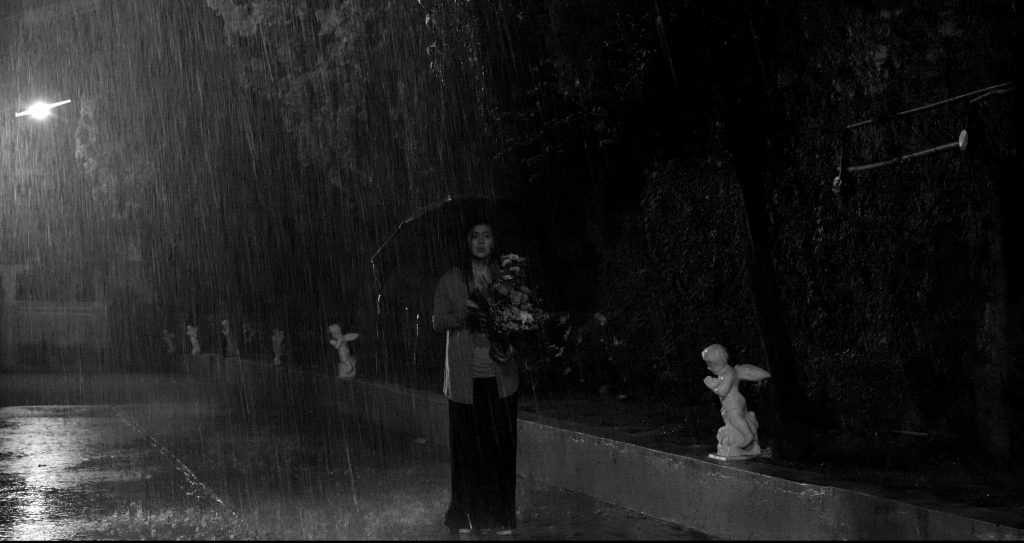
8. Ang Hupa (The Halt)
Director: Lav Diaz
“Wala nang kaluluwa ang ating bayan.”
This is how Lav Diaz fashioned his modern final fantasy. Compared to his entry in Berlin last year, this is the true season of the devil. When you watch a film made by this slow cinema auteur, nightmares turn into reality. Yet at the same time, the rhetoric behind the sociopolitical madness that is Diaz’s black and white picture show is whether or not the nightmarish future is a reflection of the equally hellish present. After all, in the era of President Rodrigo Duterte and fictional president Nirvano Navarra (Joel Lamangan), a country being led by a psychopath is dystopia incarnate. “Operation Black Rain” is the war on drugs. “The Dark Killer” is the summary killings. And the characters, governed by Fate, bank on survival as their only sight of hope to get away from the misfortune and terror that has struck our fellow kin, from the insurrections right down to the innocent deaths.
Ang Hupa is the epitome of what Duterte avoids in all of his state of the nation addresses. Clocking at almost five hours, the film mirrors the country’s future with that of the present, where the state’s caught up in a cycle of bad politics. A propagandist rock star rebel succeeds in taking down the president, but is replaced by another tyrant. Those who dare abstain from the politics in our society has kept their mouths shut and will keep it that way. Like convulsions and seizures, those who remain conflicted on what side they’d want to be on will forever be tormented by doubt and uncertainty. Victims will remain as prey to this dog eat dog world. Deaths and wars will remain. Storms and disasters will remain. Tears and sufferings will remain. The claws of darkness will remain. As for hope, it’s uncertain. Lav remains true to his vision and will continue to make movies with and for the Filipinos. Unless action is taken and justice is served, his art will continue being a never-ending, repetitive series of unfortunate events. His voice will continue to be loud yet silent all the same. His cinema will remain long and dragging. This is Lav Diaz’s sine.

7. Cleaners
Director: Glenn Barit
There’s nothing new about Cleaners‘s narrative. Nothing at all. We’ve seen its premise handled locally and internationally, like in Auraeus Solito’s Pisay and Jerrold Tarog’s Senior Year. They succeed in bringing its audiences on a trip down memory lane. We see ourselves connecting to one of the characters as each of them conquers a time where hormones are rampant, identities are questioned and ideals are synthesized. And Cleaners is no different from the films mentioned. Everyone knows this. I’m pretty sure Glenn Barit does too. What Barit succeeds in doing though is inducing nostalgia by playing with form. Barit could’ve just filmed the whole high school experience through the lens of a by-the-book director, showing each vignette the way Pisay showed theirs or Senior Year or any other high school film you can think of.
But Barit–being known for his ability to subvert his viewer’s expectations of watching small-scale stories and make them go off through playful direction–makes use of more than forty thousand photocopied frames, colors them with Stabilo markers (or whatever highlighter he and his production team could’ve bought at a bookstore), scans them back, then stitches them altogether to create a recollection of youth portrayed by characters with distinct issues–from being obsessive-compulsive to demanding respect as a class officer to falling in love for the first time to understanding corruption through barrio politics–that defined their last year in high school. A nostalgia-induced ode to one of the most messed up but unforgettable moments one could ever have in your entire life, Cleaners is a miracle. And so long as miracles exist in this world, anything is possible.
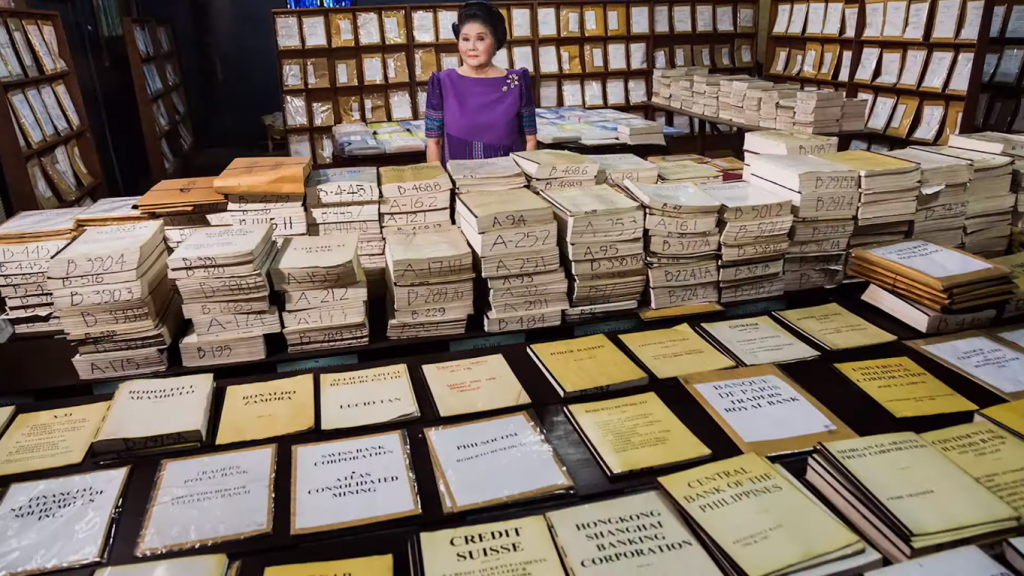
6. The Kingmaker
Director: Lauren Greenfield
In the era of fake news and historical revisionism, the first thing that the Philippine society needs is an eye-opener, an exposé that reveals the truth, the whole truth and nothing but the truth. In what seems like a perfect companion piece to Ramona S. Diaz’s 2003 documentary about the rise and fall of the Steel Butterfly of the Philippines, Lauren Greenfield–known famous for her award-winning documentary The Queen of Versailles–paints an intricate portraiture of the First Lady Imelda Marcos in The Kingmaker and acknowledges the status she still has on the current administration and on the Philippine society and treats her never as a woman eaten alive by delusion and deception. The vanity and narcissism behind her words and behavior show her ability to connive others for her to keep the power she first had the chance to enjoy through her husband.
She has been made to look like one of the women in Lorene Scafaria’s Hustlers, where she has used her “being a woman” to her advantage and has kept the wealth and power she remains to have, with her children serving as officials in the legislative branch of the nation’s government and how she is in good terms with Rodrigo Duterte especially during his presidential campaign in 2016. What makes her different from the strippers who drugged and tricked Wall Street stock traders and chief executive officers into getting their credit cards maxed out is that not only has she continued to escape the crimes accused against her, but she also remains ahead of everyone’s game. Greenfield knows that as the documentary’s unreliable narrator, she has weaved a web of lies and that anyone who dares listen to her mumble will surely fall into the trap she has intricately stitched together. She uses these “lies” to her advantage by researching and fact-checking, using testimonials from the victims of Martial Law to government chair-personnel to even the Vice President of the Philippines herself, juxtaposing perception from truth. Towards the end, you’d end up asking yourself: why are we letting Imelda Marcos and her family get away with their crimes? Because “perception is real, and the truth is not.”



